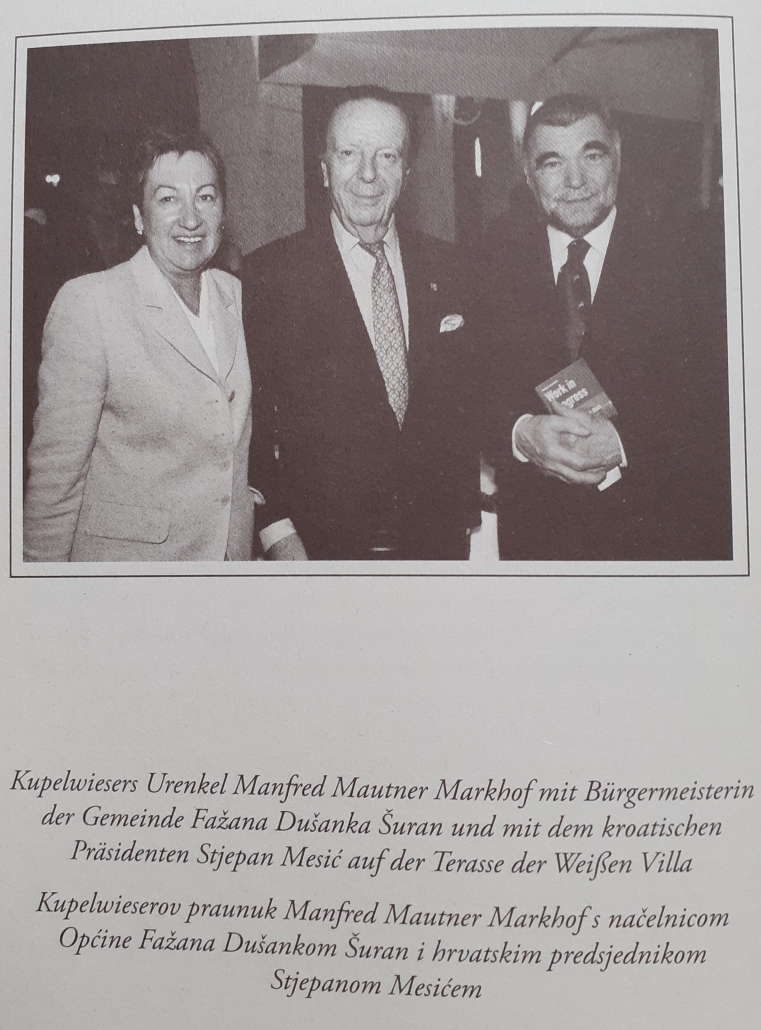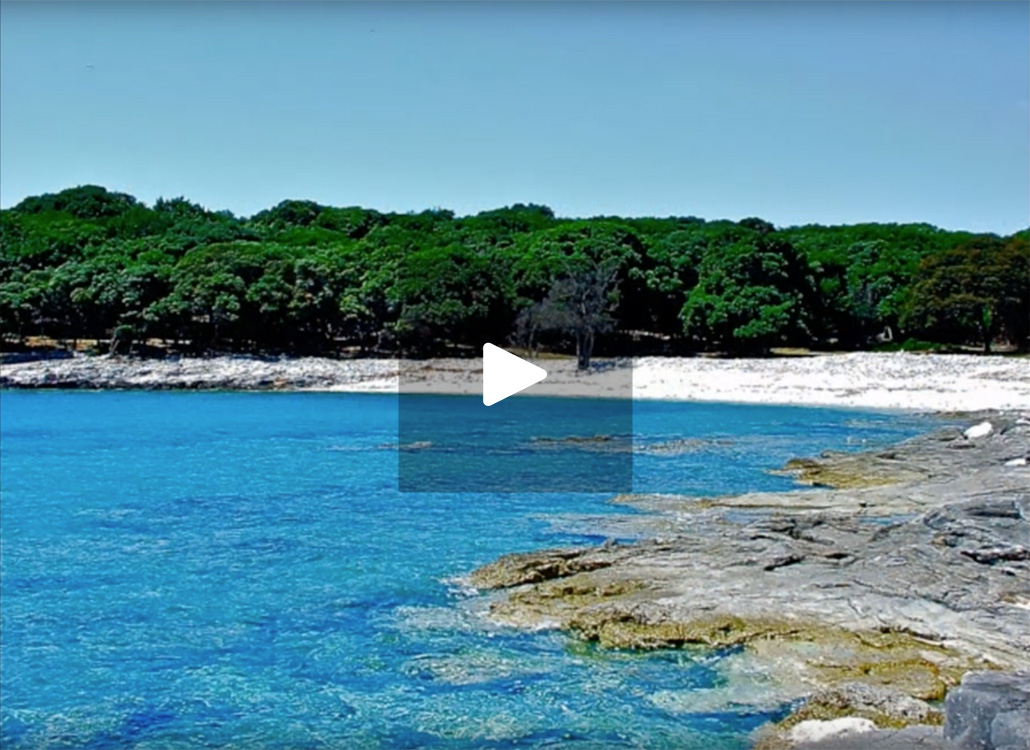Memories of a paradise
As soon as it got warmer, we – my parents, my two younger sisters Christl and Elli and I – packed our suitcases and moved to Brioni for the summer months. I have only have beautiful memories of my childhood, many of them are connected to that place, to times of perfect and carefree boisterousness. My parents had already got to know each other in their childhood on Brioni, because the families of my parents had been friends with each other for a long time and met there regularly. My mother’s family, Kupelwieser, lived on Brioni, my Mautner grandparents travelled all their lives together with their children for a holiday to Brioni. In any case, my parents’ developing friendship between children resulted in a truly fabulous “ménage a deux”, I can’t remember any spectacular incidents – my father left notes about their relationship in his two books. My father was an unbelievably enthusiastic sportsman, he was very intensively involved in all kinds of sports. Besides tennis, golf and polo he even had boxed when he was a young man. Once he wanted to take part in an official boxing event, whereupon my mother threatened him with the immediate breaking off of their engagement if he really intended to go for it – so finally he decided to give up boxing. Our Brioni family roots go back to my maternal great-grandfather, Paul Kupelwieser. That Paul Kupelwieser was not only the son of the famous classical painter Leopold Kupelwieser, but he himself was a graduate of the “Leoben University of Mining and Metallurgy” and managed to become General Director of the ironworks in Vítkovice. At the age of 50, he gave his life a radical turn; according to today’s point of view, he could probably be described as one of the first person who opted out: he switched from the iron and coal industry to the tourism department. At that time, at the end of the 1880s, forward-looking ideas were considered, especially regarding matters of tourism, with the intention to create an Austro-Hungarian Riviera, with Istria providing itself as a solution. At that time, my great-grandfather became aware of the “Brionian Islands”, owned by an Italian family who had emigrated to Portugal. In 1893, the islands, (Maggiore is the largest and probably also the most famous of them), were bought by my great-grandfather, for the considerable sum of 75,000 guilders. His goal was to make them habitable again. The most important step was to fight malaria. For that purpose, my great-grandfather had a very helpful friend, who advised him to light even the smallest puddle of water with paraffin. As a consequence, malaria could be eradicated on the Brionian Islands. That friend was the later Nobel Prize winner Robert Koch. As the next step, my great-grandfather had three hotel complexes built, two of them called “Neptune” and “Carmen”, unfortunately I cannot remember the name of the third hotel. All three hotels still exist today (even if they were given some questionable interior designs during the Tito era). However, he himself, and later also we, never stayed at one of those hotels, but in a small castle directly adjacent to it. Already at that time, extensive entertaining programmes and large recreation offers were important in order to attract tourists. Zoos as well were popular as a way of passing the time. Therefore Paul Kupelwieser, with the help of his Hamburg friend Carl Hagenbeck, the founder of the “Tiergarten Hagenbeck” in Hamburg, had built a zoo area with deep ditches instead of bars – the monkeys managed to get away not only once! From then on one could enjoy the sight of all imaginable and all kinds of exotic animal species as well as of fallow deer, which were set free all over Brioni and particularly beautiful to look at. A third friend of my great-grandfather, because of his technical abilities, was a great help when it came to organizing the transport of the guests from the mainland to the islands. He had developed an engine that one was initially very sceptical about, because of the fear that that engine would prove to be too heavy and that the boats would sink… That friend was Rudolf Diesel and as we know today, his engines worked very well and Brioni´s guests could arrive and depart by ship. It did not take a long time until Brioni became a popular holiday destination for most of the famous people. Not only the Austrian Archduke Franz Ferdinand, Emperor Wilhelm and the Saxon King Friedrich August regarded themselves as regular guests. Brioni also became a sports paradise: There were tennis courts (I remember my father in long white trousers and my mother in a white long tennis dress), an indoor swimming pool (the first one of the Monarchy), a small golf course as well as a polo field. By the way, the guests arrived with their own polo horses! I remember a very legendary polo match when the Brionian team, in which my father played, competed against the team of Malta with its most famous player Lord Mountbatten. Driving a car was forbidden on the island, but they made an exception for polo, with a bus that took the players to the field. Otherwise people were only on foot or by bike on their way. Another memory worth mentioning concerns the British Mediterranean Fleet: once, one of those ships anchored near Maggiore, and because my parents had been invited, we children were allowed to come on board as well; a very exciting adventure for us. As we all were sitting at the table to take our evening meal, a sailor approached the captain, leaning forward to whisper something into his ear. The captain nodded, whereupon the sailor marched off again. It was only later that the meaning of that scene was explained to me: With that ritual, the sailor reported the sunset to the captain and received permission to take down the flag. – A beautiful spectacle to watch.
Times are changing
After the First World War, everything changed – the big economic boom suddenly was followed by the sudden fall into the economic crisis and the already beginning political changes of the 20s and 30s were imminent. Particularly for the tourist business difficult times came and just as I thought, the Italian banks decided at that time, probably already in cooperation with the government, not to continue to support the western areas. They focused their attention upon the Ligurian coast, Genoa, Venice etc. Thus, the Brionian Islands had been dropped all at once and were no longer of any importance. The times became noticeably more and more troubled for us as well, I remember a night in February, 1934, it was winter and therefore we stayed in Floridsdorf. The St. Georg brewery lay exactly between an area called “Gartenstadt” and the “Schlingerhof”, in the middle of the political disturbances at that time, and so people shot back and forth right above our heads. In that night, my parents got us children out of our beds and we entrenched ourselves in a windowless corridor of the building. We had to wait there until the shootings were finally over. For my sisters and me it was quite exciting on the one hand, but, of course, we did not feel very comfortable. When my father went to his office in Simmering again the next morning, it was not clear whether he might return home in the afternoon because there was shooting everywhere. Thank God, he came back unscathed. In May, 1934, as every year in May, we packed our bags in Vienna, to move to Brioni. But on July 25, 1934, the day Dollfuss was assassinated, our father asked us to come back to Austria. On our way back to Vienna, we already went through areas with civil war-like conditions. I remember that in some places there was so much fighting that we had to wait for long periods until we were finally allowed to continue our journey. For us, those were the first premonitions of a war that was far from being over. My Brioni grandmother soon moved to Vienna too, and Brioni slowly went down the tubes.
So, I went back to Brioni only at the end of the 70s, with my heart pounding wildly, which were very eventful moments. I am ever so pleased that the current Croatian government is doing a lot to keep the island in good shape! Today Brioni is a national park. On many occasions, Brioni has offered itself to the respective Croatian presidents as a place for special festivities, also our deceased Federal President Thomas Klestil was invited there once. I was also among the guests and as we had been friendly for a long time I welcomed him playfully on Brioni, my former home! I am very pleased to realize that Brioni, thanks to its present status, only allows tourism in a very selective way. I place my hopes in Croatia, that they will soon become a member of the EU, because the relations between Austria and Croatia have always been very good and close. The EU gives the European peoples the opportunity to meet on a completely voluntary basis neither by conquest nor by marriage – as for the latter, we Austrians have some practice in it). In addition, I am convinced that in the future the entire Adriatic coast can be a gold mine for Croatia, not only because it is geographically close, but also because of the very pleasant climate.
As children, we loved Brioni more than anything, and we still love it today. Meanwhile I have already visited the place with nine of my twelve grandchildren and I gladly believe them when they tell me that they really like these islands, and that they do not say that merely to please their grandfather.


